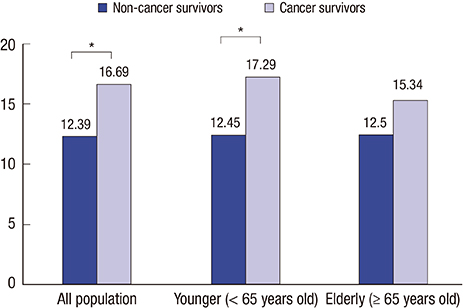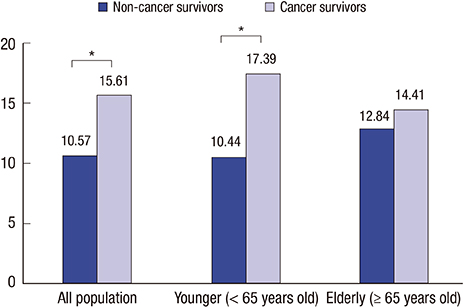J Korean Med Sci.
2016 Jul;31(7):1105-1113. 10.3346/jkms.2016.31.7.1105.
Psychological Status and Associated Factors among Korean Cancer Survivors: a Cross-Sectional Analysis of the Fourth & Fifth Korea National Health and Nutrition Examination Surveys
- Affiliations
-
- 1Center for Health Promotion & Cancer Prevention, Dongnam Institute of Radiological & Medical Sciences, Busan, Korea.
- 2Department of Biomedical Sciences & Family Medicine, Seoul National University Hospital, Seoul National University College of Medicine, Seoul, Korea. smpark.snuh@gmail.com
- KMID: 2373731
- DOI: http://doi.org/10.3346/jkms.2016.31.7.1105
Abstract
- It is important to assess psychological distress after a diagnosis for cancer survivors, a population with a high risk for psychological distress. The aim of this study is to assess psychological distress among cancer survivors and to clarify the associated factors. In this cross-sectional analysis, data were obtained from standardized questionnaires administered to 1,163 cancer survivors and 49,243 non-cancer survivors who participated in the Fourth and Fifth Korea National Health and Nutrition Examination Survey (2007-2012). We identified the adjusted rates for psychological distress and assessed factors associated with this kind of distress using multivariate logistic regression. Cancer survivors tended to have a higher adjusted rate of psychological distress than the general population. The current depressive symptom rate for cancer survivors was 16.69%, and the adjusted rate for history of depression in cancer survivors was 15.61%. The adjusted rate for higher level of stress was 25.51% in cancer survivors. Among the cancer survivors, younger subjects, female subjects, and those with limited social support were more prone to psychological distress. In addition, current smokers or risky drinkers, those with chronic diseases, and those with a poor self-perception of their health status were also identified as a high-risk group for psychological distress. As the number of cancer survivors has increased, the importance of assessing psychological distress after a cancer diagnosis should be emphasized among all cancer survivors. Further, psychological supportive care interventions for cancer survivors are needed to improve the survival rate and improve their quality of life.
Keyword
MeSH Terms
Figure
Reference
-
1. Hoffman KE, McCarthy EP, Recklitis CJ, Ng AK. Psychological distress in long-term survivors of adult-onset cancer: results from a national survey. Arch Intern Med. 2009; 169:1274–1281.2. Jung KW, Won YJ, Kong HJ, Oh CM, Cho H, Lee DH, Lee KH. Cancer statistics in Korea: incidence, mortality, survival, and prevalence in 2012. Cancer Res Treat. 2015; 47:127–141.3. Mitchell AJ, Chan M, Bhatti H, Halton M, Grassi L, Johansen C, Meader N. Prevalence of depression, anxiety, and adjustment disorder in oncological, haematological, and palliative-care settings: a meta-analysis of 94 interview-based studies. Lancet Oncol. 2011; 12:160–174.4. Harrison SE, Watson EK, Ward AM, Khan NF, Turner D, Adams E, Forman D, Roche MF, Rose PW. Primary health and supportive care needs of long-term cancer survivors: a questionnaire survey. J Clin Oncol. 2011; 29:2091–2098.5. Donovan KA, Jacobsen PB. Progress in the implementation of NCCN guidelines for distress management by member institutions. J Natl Compr Canc Netw. 2013; 11:223–226.6. Zabora J. BrintzenhofeSzoc K, Curbow B, Hooker C, Piantadosi S. The prevalence of psychological distress by cancer site. Psychooncology. 2001; 10:19–28.7. Chochinov HM, Wilson KG, Enns M, Lander S. Prevalence of depression in the terminally ill: effects of diagnostic criteria and symptom threshold judgments. Am J Psychiatry. 1994; 151:537–540.8. Fallowfield L, Ratcliffe D, Jenkins V, Saul J. Psychiatric morbidity and its recognition by doctors in patients with cancer. Br J Cancer. 2001; 84:1011–1015.9. Passik SD, Dugan W, McDonald MV, Rosenfeld B, Theobald DE, Edgerton S. Oncologists' recognition of depression in their patients with cancer. J Clin Oncol. 1998; 16:1594–1600.10. Valdimarsdóttir U, Helgason AR, Fürst CJ, Adolfsson J, Steineck G. The unrecognised cost of cancer patients' unrelieved symptoms:a nationwide follow-up of their surviving partners. Br J Cancer. 2002; 86:1540–1545.11. Kurtz ME, Kurtz JC, Given CW, Given B. Relationship of caregiver reactions and depression to cancer patients' symptoms, functional states and depression--a longitudinal view. Soc Sci Med. 1995; 40:837–846.12. Choi KH, Park SM, Lee K, Lee JH, Park JS. Influenza vaccination and associated factors among Korean cancer survivors : a cross-sectional analysis of the Fourth & Fifth Korea National Health and Nutrition Examination Surveys. J Korean Med Sci. 2014; 29:1061–1068.13. Ganry O, Baudoin C, Fardellone P. Effect of alcohol intake on bone mineral density in elderly women: The EPIDOS Study. Epidémiologie de l'Ostéoporose. Am J Epidemiol. 2000; 151:773–780.14. Denlinger CS, Ligibel JA, Are M, Baker KS, Demark-Wahnefried W, Dizon D, Friedman DL, Goldman M, Jones L, King A, et al. Survivorship: healthy lifestyles, version 2.2014. J Natl Compr Canc Netw. 2014; 12:1222–1237.15. Lim SM, Kim HC, Lee S. Psychosocial impact of cancer patients on their family members. Cancer Res Treat. 2013; 45:226–233.16. Zhao G, Okoro CA, Li J, White A, Dhingra S, Li C. Current depression among adult cancer survivors: findings from the 2010 Behavioral Risk Factor Surveillance System. Cancer Epidemiol. 2014; 38:757–764.17. Cho J, Choi EK, Kim SY, Shin DW, Cho BL, Kim CH, Koh DH, Guallar E, Bardwell WA, Park JH. Association between cancer stigma and depression among cancer survivors: a nationwide survey in Korea. Psychooncology. 2013; 22:2372–2378.18. Arrieta O, Angulo LP, Núñez-Valencia C, Dorantes-Gallareta Y, Macedo EO, Martínez-López D, Alvarado S, Corona-Cruz JF, Oñate-Ocaña LF. Association of depression and anxiety on quality of life, treatment adherence, and prognosis in patients with advanced non-small cell lung cancer. Ann Surg Oncol. 2013; 20:1941–1948.19. Ell K, Sanchez K, Vourlekis B, Lee PJ, Dwight-Johnson M, Lagomasino I, Muderspach L, Russell C. Depression, correlates of depression, and receipt of depression care among low-income women with breast or gynecologic cancer. J Clin Oncol. 2005; 23:3052–3060.20. Momino K, Akechi T, Yamashita T, Fujita T, Hayahi H, Tsunoda N, Miyashita M, Iwata H. Psychometric properties of the Japanese version of the concerns about recurrence scale (CARS-J). Jpn J Clin Oncol. 2014; 44:456–462.21. Weissman MM, Bland RC, Canino GJ, Faravelli C, Greenwald S, Hwu HG, Joyce PR, Karam EG, Lee CK, Lellouch J, et al. Cross-national epidemiology of major depression and bipolar disorder. JAMA. 1996; 276:293–299.22. Hughes S, Jaremka LM, Alfano CM, Glaser R, Povoski SP, Lipari AM, Agnese DM, Farrar WB, Yee LD, Carson WE 3rd, et al. Social support predicts inflammation, pain, and depressive symptoms: longitudinal relationships among breast cancer survivors. Psychoneuroendocrinology. 2014; 42:38–44.23. Huang CY, Hsu MC. Social support as a moderator between depressive symptoms and quality of life outcomes of breast cancer survivors. Eur J Oncol Nurs. 2013; 17:767–774.24. Han KH, Hwang IC, Kim S, Bae JM, Kim YW, Ryu KW, Lee JH, Noh JH, Sohn TS, Shin DW, et al. Factors associated with depression in disease-free stomach cancer survivors. J Pain Symptom Manage. 2013; 46:511–522.25. Carlson LE, Bultz BD. Cancer distress screening. Needs, models, and methods. J Psychosom Res. 2003; 55:403–409.26. Trask PC. Assessment of depression in cancer patients. J Natl Cancer Inst Monogr. 2004; 2004:80–92.27. Boyes AW, Girgis A, D'Este C, Zucca AC. Flourishing or floundering? Prevalence and correlates of anxiety and depression among a population-based sample of adult cancer survivors 6 months after diagnosis. J Affect Disord. 2011; 135:184–192.28. Shinn EH, Basen-Engquist K, Thornton B, Spiess PE, Pisters L. Health behaviors and depressive symptoms in testicular cancer survivors. Urology. 2007; 69:748–753.29. Duffy SA, Ronis DL, Valenstein M, Fowler KE, Lambert MT, Bishop C, Terrell JE. Depressive symptoms, smoking, drinking, and quality of life among head and neck cancer patients. Psychosomatics. 2007; 48:142–148.30. Browman GP, Wong G, Hodson I, Sathya J, Russell R, McAlpine L, Skingley P, Levine MN. Influence of cigarette smoking on the efficacy of radiation therapy in head and neck cancer. N Engl J Med. 1993; 328:159–163.31. Chelghoum Y, Danaïla C, Belhabri A, Charrin C, Le QH, Michallet M, Fiere D, Thomas X. Influence of cigarette smoking on the presentation and course of acute myeloid leukemia. Ann Oncol. 2002; 13:1621–1627.32. Park JJ, Park HA. Prevalence of cigarette smoking among adult cancer survivors in Korea. Yonsei Med J. 2015; 56:556–562.33. Choi KH, Park SM, Lee K, Kim KH, Park JS, Han SH. Prevalence, awareness, control, and treatment of hypertension and diabetes in Korean cancer survivors: a cross-sectional analysis of the Fourth and Fifth Korea National Health and Nutrition Examination Surveys. Asian Pac J Cancer Prev. 2013; 14:7685–7692.34. Kim SH, Son BH, Hwang SY, Han W, Yang JH, Lee S, Yun YH. Fatigue and depression in disease-free breast cancer survivors: prevalence, correlates, and association with quality of life. J Pain Symptom Manage. 2008; 35:644–655.35. Vissers PA, Thong MS, Pouwer F, Zanders MM, Coebergh JW, van de Poll-Franse LV. The impact of comorbidity on health-related quality of life among cancer survivors: analyses of data from the PROFILES registry. J Cancer Surviv. 2013; 7:602–613.36. Moubayed SP, Sampalis JS, Ayad T, Guertin L, Bissada E, Gologan OE, Soulières D, Lambert L, Filion E, Nguyen-Tan PF, et al. Predicting depression and quality of life among long-term head and neck cancer survivors. Otolaryngol Head Neck Surg. 2015; 152:91–97.37. Tagay S, Herpertz S, Langkafel M, Erim Y, Bockisch A, Senf W, Görges R. Health-related quality of life, depression and anxiety in thyroid cancer patients. Qual Life Res. 2006; 15:695–703.38. Andersen BL, DeRubeis RJ, Berman BS, Gruman J, Champion VL, Massie MJ, Holland JC, Partridge AH, Bak K, Somerfield MR, et al. Screening, assessment, and care of anxiety and depressive symptoms in adults with cancer: an American Society of Clinical Oncology guideline adaptation. J Clin Oncol. 2014; 32:1605–1619.
- Full Text Links
- Actions
-
Cited
- CITED
-
- Close
- Share
- Similar articles
-
- Influenza Vaccination and Associated Factors among Korean Cancer Survivors : A Cross-Sectional Analysis of the Fourth & Fifth Korea National Health and Nutrition Examination Surveys
- Factors Associated with Stress among Employed Korean Cancer Survivors: A Cross-sectional Descriptive Study Based on National Data
- The Factors Related to the Non-Practice of Cancer Screening in Cancer Survivors: Based on the 2007-2012 Korean National Health and Nutrition Examination Survey
- Factors That Predict Persistent Smoking of Cancer Survivors
- The Association between Cancer Screening and Cancer History among Korean Adults: The 2010–2012 Korea National Health and Nutrition Examination Survey




